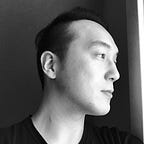On design changing the world
Musings on an interview from a decade past
“It’s the everyday work of a designer that requires your focus, your intuition, your curiosity, your love.”
The job interview
“I want to change the world”, I say during the job interview, “and I believe that good design can do this.”
The art director mused, a deep sigh and a furtive look out the window. “That’s an admirable thought”, she murmurs, “but in what way? Through a product? Through an innovative way of communicating?”
“I like to think that design, and design thinking are universal and widely applicable,” I pause, thinking to improvise on the response I had drafted the night before. “And if we can instil the principles of design into the driving forces behind businesses, nonprofits and our politics, perhaps we can drive towards finding and solving the problems that most need solving. That’s how we’ll change the world.”
She looked out the window again, thinking. After a quiet minute we had small talk about favourite typefaces and brainstorming techniques. I left, wondering perhaps if my perspective on the world-changing power of design had left her shell-shocked, amused, or mortified. Any reaction is a good reaction in a job interview, I thought. That is, until I never heard from her again.
That night
In the evening, a mentor called to check on how the interview had gone. I told him about how I had professed a strong inclination towards design’s role in saving humanity from a dark abyss of ugliness and unusable products. “Truly philosophical shit”, was how I described it to him. I asked him what he thought about it — about design changing the world.
“I used to think the same way,” the mentor lamented cheerfully, “but I’m a bit less ambitious these days.”
“Some days”, he continued, “it’s just enough to do my job, to the best of my ability.” He paused, as if digging deeply for a memory long lost in some hidden pocket. “And if I know I’ve done the best that I can with what I’ve got, and made some impact on someone’s personal experience with something, I’m deeply satisfied with that. Then I go home, write down what I did, and try to do it even better next time. There’s not necessarily anything life changing or world changing in the work that I do. But it’s good work, and I’m satisfied with that.”
“But,” I sputter, hoping to steer the conversation astern, “if we have the capability, the knowledge, and the resources to change the world for the better, shouldn’t designers commit themselves to this end? As if nothing else matters?”
The mentor chuckled and I could hear him scratching meaningfully at his head over the phone. “Well yeah of course! But…”, he stopped mid-sentence to gather another deeply buried thought.
“Let’s be honest. To be able to design solutions that benefit humanity on a global scale, requires a degree of focus that, let’s admit, very few people have today. We’ve long eclipsed the golden age of professionals that can execute across disciplinary boundaries. It’s going to take focus! Such dispassionate and hardened focus, in order for humanity to design it’s way out of where we are.”
He sighs. “And we can only do that by being very, very good at what we do; by respecting our craft and being content with repeating our process over and over again.” He stops, and I hear the radio humming softly in the background.
“We can change the world, only once we accept that it’s the everyday, mundane work of design that has the potential to stir change. And it’s the everyday work of a designer that requires your focus, your intuition, your curiosity, your love.”
Dedicated to my esteemed mentors, Ernie Bin, Jaybe Allanson, Carolina Becerra, Roger Lee, and Irvin Cheung. You hired me, trained me, and always spurred me towards greater heights. Remarkably you all took a chance on me, and one day I shall do the same for a young designer trying to find their way.
